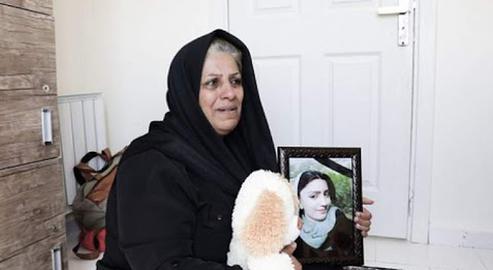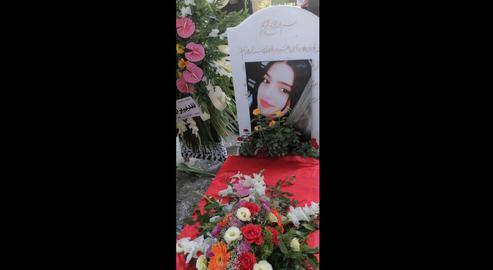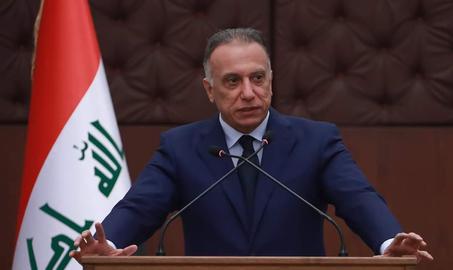"He threw my girl, my bouquet of flowers, whom I had worked hard for for 16 years, out of the window in front of my eyes, and then placed her body in my hands. He has now been released on bail and walks free. He threatens my son, and tells him, 'It’s your turn now!'.
“I’m afraid for myself and my children. Tell me, in what other country in the world, when a murder has occurred and all the evidence points to the fact it was murder, would the accused be released on bail two weeks later?"
These painful words are spoken by Bariha Rahmani, mother of the late Fatemeh Ghozati. Her 16-year-old girl had been viciously beaten by her half-uncle, Mojtaba Namdar, on May 22 this year. When Fatemeh refused to remain silent in the face of his obscenities, she was hurled from the 11th floor window of their apartment in the Shahrah-e Aseman neighbourhood of Parand, southeast Tehran.
The incident occurred in front of Fatemeh’s family and their friends. The teenager died of her injuries.
Bariha Rahmani says that Fatemeh’s killer, an uncle not related to her by blood, is a notorious and feared criminal in the Shahriyar area of Tehran. Rahmani separated from her first husband and her second is, she says, a “calm person” who had cut off ties with his family because of their past “misdeeds” and “has become a father to my children”.
But somehow her husband’s brother Mojtaba Namdar was able to re-enter their lives. “Mojtaba entered our lives with a plan and a conspiracy,” Rahmani says. “He involved my husband in a job that ended up putting us 200 million tomans [US$10,000] in debt, for which my husband was imprisoned. Mojtaba had several ongoing court cases and we didn’t know whether he had been acquitted of something or released on bail. His going and coming back from prison is routine. Everyone is afraid of him. In front of our own eyes, after killing my children, he started threatening me, and finally he started saying that Fatemeh had committed suicide."
Rahmani says that despite the fact that Fatemeh's father, stepfather, and herself accused Namdar of the murder of her daughter, he was released on bail two weeks later. Now, she says, she does not dare stay at home for fear that Namdar will carry out his threats.
“Everywhere I go, I take the children with me,” she says. “My son was working in a car battery dealership. I will not let him go to work because of Mojtaba's threats. He has admitted to us many times that he killed my daughter, and says he will pay her blood money, while threatening my other two children. I’m scared to stay anywhere."
The Night of the Killing
Fatemeh Ghozati lived with her mother, sister and brother Shahrak-e Aseman. On the night of May 22, 2020, they had guests: her mother’s friend and her daughter. In Rahmani’s telling, that day Namdar had called to tell her that he had visited her husband in prison, and visited in the evening along with his girlfriend to talk to them about it.
For her part, Fatemeh had just returned home from a 20-day visit to her father. “The tiredness of the trip was on her face,” her mother says. “When she arrived, she greeted everyone. She was shaking hands with her half-uncle’s girlfriend when Mojtaba asked her why she looked ‘like a monkey’. Fatemeh was angry and answered him back."
The argument between Fatemeh and Namdar escalated from there from there. Rahmani says that she tried to send her daughter to a neighbor's home, but they were not at home, so Fatemeh returned to the apartment. Seeing her, Rahmani says, threw Namdar into a violent rage. He attacked Fatemeh, slamming her head against the wall.
"He punched and kicked my daughter with all the energy in his body,” she says. “There is a forensic report confirming that Fatemeh was beaten by Mojtaba. He knocked Fatemeh's head against the wall, the mark of which is still there. I was struggling to separate my child from him; I was fainting. I managed to persuade Mojtaba to leave, and he left our house with his girlfriend."
But the altercation did not end there. With the righteous anger of a teenager, Fatemeh sent an expletive-laden text to Namdar. The content of the message incensed Namdar so much that he returned to the flat, and after beating Rahmani herself, he turned on Fatemeh and threw her out of the 11th storey window.
"My daughter did not even get a chance to scream," her mother says. “Except for my friend's daughter and I, who were in the room, the others entered when Fatemeh was already gone.
“Now Mojtaba, with the influence that he has, and everyone's fear of him – even at Shahriyar police station – has altered the course of the case. They pretend that the murder never took place, and that Fatemeh threw herself out.”
Relatives insist that Mojtaba Namdar confessed to killing Fatemeh in front of all their neighbors before emergency services arrived at the crime scene. But after the girl was pronounced dead, he retracted this and claimed there had been no witnesses.
“In front of all the friends and the neighbors,” says Rahmani, “he said ‘Yes, I killed her, and I’ll pay 200 million tomans for her blood money’. But then, back at home, he threatened my friend's daughter who had witnessed the crime with me, and made it look like suicide.
“It has been two weeks since he was released. There were no forensic tests, and no one came to ask what happened. No reconstruction of the murder scene; nothing. The only thing left is the scar on my heart and my fear for my family."
Police and Lawyers Hamstrung in Pursuit of Justice
It is not clear why Namdar was not held in custody after three adults accused him of murder. Musa Barzin Khalifehloo, a lawyer and IranWire’s legal adviser, described the case as “ambiguous”. “The details of the case are not clear,” he said. “He may have been acquitted in some cases and released on bail in others, and in others he may have served his sentence, but it is questionable that he was released on bail two weeks into a murder case."
Article 32 of Iran’s penal code states that in cases of premeditated murder, even if the close relatives of the deceased – those entitled to qisas, or retributive justice, in Islamic law – consent to the release of the accused, if there is a concern that the accused will abscond or attempt to interfere with other defendants or witnesses in the case, investigators may issue a temporary detention order.
Musa Barzin Khalifeloo added: "Evidence suggests that in this case the relatives have not been able to prove the murder by the person in question – and the second hypothesis, suicide, has been accepted by judicial officers. Or that some of the relatives have agreed that the accused can remain out of custody until the trial is held. If the latter did not happen, the fear raised by the family that the accused has colluded with informants is not so far-fetched."
Fatemeh Ghozati's family say that all evidence needed to prove Namdar’s guilt is in the case file. “It is true that he is constantly threatening us and our witness,” says Rahmani, “but the witness is still willing to appear in court. There is a forensic report confirming that Fatemeh had broken arms and ribs as a result of the beating. There is CCTV footage showing the accused entering our house in anger. The remaining issue is the protection of the victim in law, which we are lacking. We just want the judiciary to bring our daughter’s killer to justice."
In cases such as this, IranWire’s lawyer notes, where the accused has an extensive criminal record and is well known in the area, the terror their reputation creates can lead to panic among would-be witnesses. “Unfortunately, to weaknesses in the law and the ignorance of the agents and police cadres, as well as citizens' fear of wrongdoers and criminals, all go hand in hand and lead to disruptions in such cases.
“One of the problems is the initial absence of an investigating officer. Usually, the investigator does not accompany the police officers in the initial stage, and if something is manipulated at the crime scene of the murder – with or without the help of police officers or the accused – this will disrupt the investigating process.
“It seems that according to the statements of the victim’s relatives and their observation of the accused's relationship with the police officers, he has succeeded in gaining the favorable opinion of some of them in order to save himself from this incident. In any case, my advice to the victim's family is to seek the help of a lawyer to complete the case and seek legal redress."
The fact that Fatemeh's mother and relatives say that the accused has repeatedly threatened them and confessed to the murder, he adds, does not justify the presumption of murder in law: "Confession to murder in interrogation and confession to murder at the crime scene are two separate matters. According to the description of the case in question, the accused confessed to the murder at the time of the crime. In legal terms this is deemed "circumstantial" and is different to a formal confession. If these statements are later denied, the investigator can do nothing. It is important that the person confesses to the murder during the interrogation process."
All the Lights Turn Out
"With the death of Fatemeh, the lights in my home have gone out," says Bariha Rahmani. "This girl was the light of my life. Everyone was thinking about the future. She said that she wanted to become a lawyer and release two or three prisoners, like her father, every year. Why should she commit suicide? I had cancer and I just got better. My child has been killed and now they pretend that it was a suicide: with threats, pressure, and collusion."
visit the accountability section
In this section of Iran Wire, you can contact the officials and launch your campaign for various problems



























comments